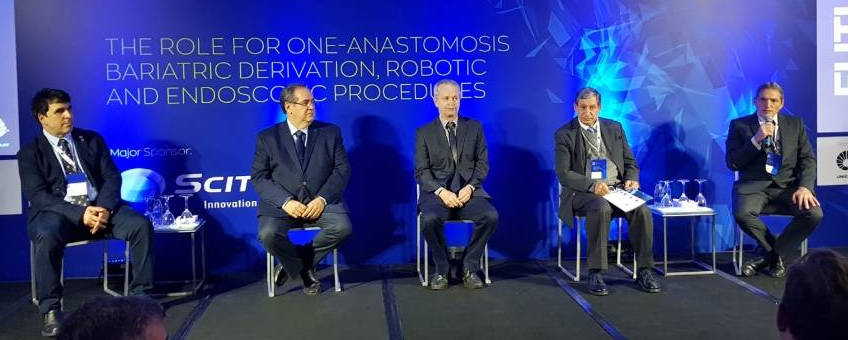Future Trends in Bariatric and Metabolic Surgery 2019
On June 7th and 8th, the Bariatric Surgery Service of the Unicamp University Hospital organized the event "The role of intestinal bypass surgery, bariatric bypass, robotics and endoscopic procedures", with the presence of national and international experts. The first day’s event took place at Hotel Vitória, while the second day’s event, in the Hospital auditorium. Surgeons discussed the trends and future of metabolic bariatric surgeries in Brazil and worldwide.
The opening ceremony was attended by Professor Antonio Gonçalves de Oliveira Filho, University Hospital’s Director, Professor Manoel Barros Bertolo, Director of the Health Area of SMS - Unicamp, Professor Nelson Adami Andreollo (SMS - Unicamp), scientific coordinator of the event, and Professor Almino Cardoso Ramos of the Federal University of ABC. Professor Lício Veloso, from SMS - Unicamp, conducted the event’s opening lecture.

For the main coordinator of the course, professor Elinton Adami Chaim, the presence of nationally and internationally renowned physicians provided a high-level scientific programming that brought many scientific innovations in surgical practice. "The intention was to discuss technical aspects, indications, complications, literature review and, even, to transmit in real time to the participants, two surgical modalities that will happen here at the Hospital", explained professor Chaim, who coordinates the Hospital’s Bariatric Surgery Service.
In the opinion of the surgeon professor Caetano Marchesini, from Curitiba, Paraná, and former President of the Brazilian Bariatric and Metabolic Surgery Society, the population needs to understand that metabolic bariatric surgery is not only a matter of weight loss, but aims to treat serious diseases associated with obesity such as diabetes, dyslipidemia and hypertension. "Metabolic surgery today offers a lot of data for science proving its results and helping in the development of new drugs," he explained.
Metabolic surgery consists of the same procedure as bariatric surgery. The difference is that metabolic surgery is aimed at controlling the disease, while on the other hand, bariatric surgery aims at weight loss, with goals for disease control, such as diabetes and hypertension.
According to the studies analyzed and published, metabolic surgery is safe and has short, medium and long term positive results, decreasing mortality of cardiovascular origin, as shown by prospective studies with more than 20 years of follow-up, series of controlled cases, as well as randomized and controlled studies.
"One of the key factors today for metabolic surgery is that the medicine already knows which patient will no longer have the disease and which patient will return to have the disease, for example Type 2 diabetes, but with better control and more clinical benefits”, explained Prof. Marchesini.
Four foreign guests were present at the event, all gastrointestinal surgeons from renowned hospitals and universities in the United States, Mexico, Chile and Spain. They are Antonio José Torres (Spain), André Teixeira (USA), José Antonio Castañeda Cruz (Mexico) and Marcos Berry (Chile). The current president of the International Federation for the Surgery of Obesity and Metabolic Disorders - IFSO, professor Almino Cardoso Ramos, is also a member of the panel of lecturers.
Brazil spends about 2.3% of the domestic product or R$ 55 billion in the fight against obesity and associated diseases. This is a problem that starts during childhood, because 50% of children are overweight and if nothing is done to help them, they will become sick adults. Across the country, only 10% of metabolic surgeries are performed in public hospitals such as the Unicamp University Hospital. "Brazil has always been a pioneer in research with metabolic surgeries and we are not behind the first world countries," said professor Chaim.
